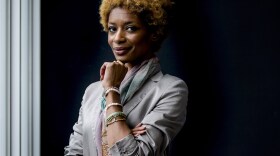
Lauren Frayer
Lauren Frayer covers India for NPR News. In June 2018, she opened a new NPR bureau in India's biggest city, its financial center, and the heart of Bollywood—Mumbai.
Before moving to India, Lauren was a regular freelance contributor to NPR for seven years, based in Madrid. During that time, she substituted for NPR bureau chiefs in Seoul, London, Istanbul, Islamabad, and Jerusalem. She also served as a guest host of Weekend Edition Sunday.
In Europe, Lauren chronicled the economic crisis in Spain & Portugal, where youth unemployment spiked above 50%. She profiled a Portuguese opera singer-turned protest leader, and a 90-year-old survivor of the Spanish Civil War, exhuming her father's remains from a 1930s-era mass grave. From Paris, Lauren reported live on NPR's Morning Edition, as French police moved in on the Charlie Hebdo terror suspects. In the fall of 2015, Lauren spent nearly two months covering the flow of migrants & refugees across Hungary & the Balkans – and profiled a Syrian rapper among them. She interviewed a Holocaust survivor who owed his life to one kind stranger, and managed to get a rare interview with the Dutch far-right leader Geert Wilders – by sticking her microphone between his bodyguards in the Hague.
Farther afield, she introduced NPR listeners to a Pakistani TV evangelist, a Palestinian surfer girl in Gaza, and K-pop performers campaigning in South Korea's presidential election.
Lauren has also contributed to The New York Times, the Los Angeles Times, and the BBC.
Her international career began in the Middle East, where she was an editor on the Associated Press' Middle East regional desk in Cairo, and covered the 2006 Israel-Hezbollah war in Syria and southern Lebanon. In 2007, she spent a year embedded with U.S. troops in Iraq, an assignment for which the AP nominated her and her colleagues for a Pulitzer Prize.
On a break from journalism, Lauren drove a Land Rover across Africa for a year, from Cairo to Cape Town, sleeping in a tent on the car's roof. She once made the front page of a Pakistani newspaper, simply for being a woman commuting to work in Islamabad on a bicycle.
Born and raised in a suburb of New York City, Lauren holds a bachelor's degree in philosophy from The College of William & Mary in Virginia. She speaks Spanish, Portuguese, rusty French and Arabic, and is now learning Hindi.
-
As the country reels from its financial crisis, a new restaurant, run by a Catholic priest, lets paying daytime customers foot the dinner bill for homeless people to dine with dignity — and style.
-
Geert Wilders wants his country to return to its white, Christian roots, shut down mosques and exit the EU. He's favored to win March elections, though unlikely to become prime minister.
-
The Dutch village of Volendam is prosperous, picturesque — and a stronghold of Geert Wilders' far-right Freedom Party. Though it has few immigrants, Wilders' anti-immigrant message resonates.
-
With an anti-immigrant party looking strong in the polls, new parties that support immigrants and minorities are cropping up in an attempt to serve as a counterweight.
-
As the clock strikes midnight, people in Spain gobble 12 grapes in quick succession, with wishes for the new year. Then, they go out to party all night long with cava, a Spanish sparkling white wine.
-
As ISIS loses ground in Syria and Iraq, police in Europe are concerned the group may step up attacks in the holiday season. Meanwhile, Muslims in Europe report increased harassment and discrimination.
-
Children in Spain, facing up to three hours of homework a night, have put down their pens and pencils in protest. "We all want our children to succeed," says one father who supports the strike.
-
Antonino Fernandez, who made his fortune from Corona beer, died in Mexico in August at 98. But he never forgot where he came from — a tiny village in northern Spain that he helped support for decades.
-
Clara Peeters, a 17th century Flemish painter, hid tiny self-portraits in her still life paintings. She wasn't a household name, then or now, and just 40 or so of her paintings have survived.
-
Some women in Israel's ultra-Orthodox community are pressing for greater rights in confrontations playing out at places including a radio station and the most important site for Jewish prayer.










